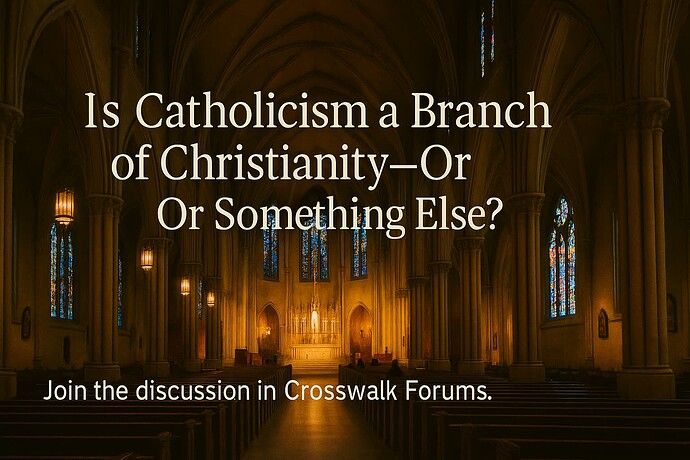The best and most natural way I know how to have this kind of conversation, is to talk about history. So what follows is a very brief, super simplistic description of events from about the 1st century to the 15th century.
When we get back to the very beginning of Christianity we’re talking about the Church. Early Christians spoke about the Church in different ways. The Church is holy, the Church is one, the Church is apostolic, and the Church is catholic. This last term, “catholic” refers to the Greek adjective katholikos, meaning “according to the whole”. In its original sense it emphasized the Christian Church in her entirety, the whole Church. There was the Church in Jerusalem, there was the Church in Rome, there was the Church in Antioch, or in Corinth, or in Ephesus, etc. But all of these were part of the one, whole or universal, Christian Church. Christ is not divided, Christ’s Body is not divided; ergo Christ’s Church (His Body) is not divided. Christians, therefore, were supposed to be united, not divided. And so this catholicity of the Church affirmed the unity of the Church–no matter your own personal background, where you were born, where you lived, you were, because you are in Christ and part of the one universal brotherhood of believers, a member of that one united entire (Catholic) Church.
As time marched forward, the Church faced a lot of pressures, for example there was persecution. But also there were various people saying things which didn’t jive with the received faith handed down by the apostles. Heretics in other words, who were saying things that just were very wrong, sometimes these were people claiming secret knowledge, or they claimed special new revelation. But other times they were saying things that seemed biblical and apostolic, but it just wasn’t quite right (in fact it was quite wrong). So sometimes there were these schismatic groups that formed, various Gnostic sects for example, or rival churches (e.g. the Marcionite Church), or there would be disruptions in communion because a bishop subscribed to a wrong idea about Jesus (e.g. Sabellianism, Arianism). And so the Church had to deal with these issues by insisting on the preservation of the truth once delivered since the time of the apostles.
This led to large “worldwide” councils of bishops, the early Ecumenical Councils. The most famous being Nicea in 325 AD which addressed the Arian controversy. At the end of the 4th century there was still that one, same, united, undivided, Catholic Christian Church, the one holy catholic and apostolic Church of Jesus Christ.
In the 5th century some significant Christological debates broke out. In 431 the Council of Ephesus ended up condemning Nestorius, but the side effect of this was a major schism, resulting in a break of communion between the churches which affirmed Ephesus and those which did not. The latter, today, often calls itself the Church of the East, and historically was based in what is modern day Iraq. The Church of the East, in the 1st Millennium, was responsible for some of the most far-reaching missionary activies until modern times, with missions extending all the way to China by the 7th century AD and the establishment of Christian communities.
In 451 the Council of Chalcedon addressed what became known as the Eutychian or Monophysite Controversy. This resulted in a major schism between the Chalcedonians and non-Chalcedonians. The non-Chalcedonians, affirming the Miaphysite position, are today known as the Oriental Orthodox Churches (including the Coptic Orthodox Church, the Armenian Apostolic Church, the Syriac Orthodox Church, and the Ethiopian Tewahedo Orthodox Church).
Following 451, until 1054 the Western and Eastern churches that followed Chalcedon continued united. However there were hiccups, and things did start to break down. The reasons are complicated, but to briefly summarize: in 1054 the bishop of Rome and the bishop of Constantinople, effectively, excommunicated one another. It’s not that simple, but for brevity let’s continue.
In the centuries following this “Great Schism” also called the “East-West Schism” of 1054, there were further developments. By the 15th century the division of East and West was pretty final, the Council of Florence and the conquest of Constantinople by the Ottomans resulted in a pretty radical change in the overall shape and look of “Christendom”. The Western Church, i.e. that Church which is in communion with the Bishop of Rome, calls itself The Catholic Church, and sees itself as the same undivided Church Jesus founded two thousand years ago. The Eastern Church, i.e. the Churches in communion with the Bishops of Constantinople, Alexandria, Antioch, and Jerusalem calls itself The Orthodox Church, and sees itself as the same undivided Church Jesus founded two thousand years ago.
So before we even get to the Protestant Reformation of the 16th century, or talk about pre-Protestant reform movements in Western Europe such as the Hussites. We need to look at the picture here:
At the start of the 15th century there is, effectively, four communions all which claim to be “The One Holy Catholic and Apostolic Church” mentioned in the Nicene Creed, the Church Jesus founded as mentioned in the Gospel of Matthew. These are the Church of the East, the Oriental Orthodox Church, the Eastern Orthodox Church, and the [Roman] Catholic Church.
I’ll leave it here, because double posts aren’t allowed and this post is already very long.
![]() https://www.crosswalk.com/church/pastors-or-leadership/what-is-catholicism.html?utm_medium=cwforums&utm_source=Forums&utm_campaign=cwpost
https://www.crosswalk.com/church/pastors-or-leadership/what-is-catholicism.html?utm_medium=cwforums&utm_source=Forums&utm_campaign=cwpost